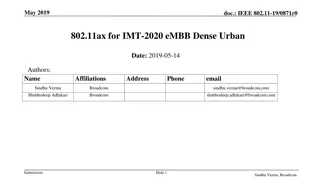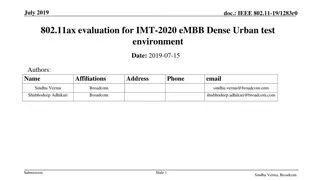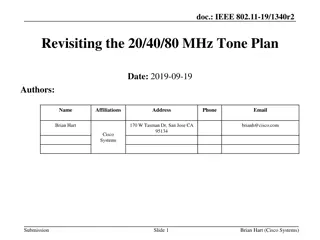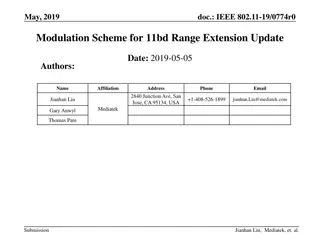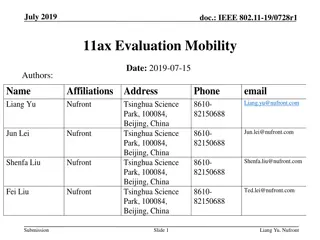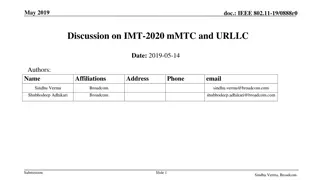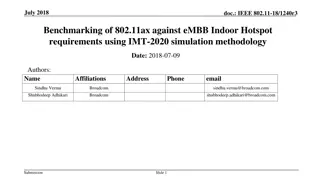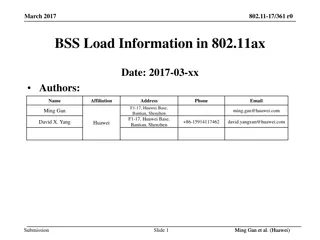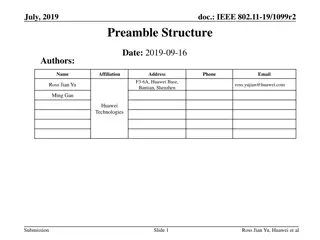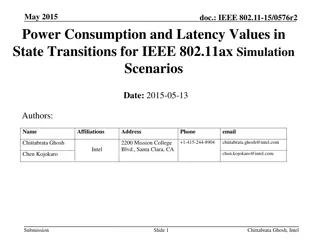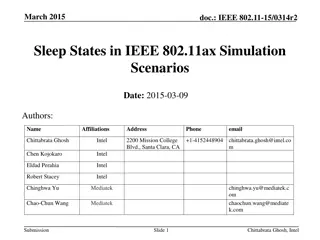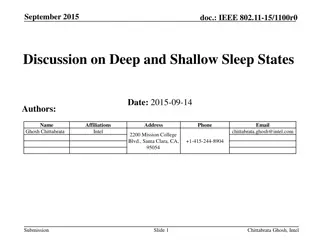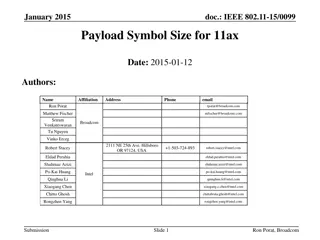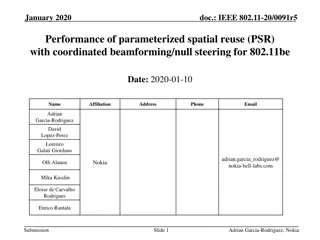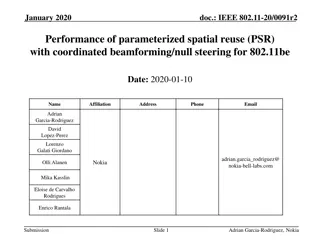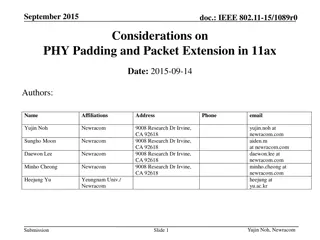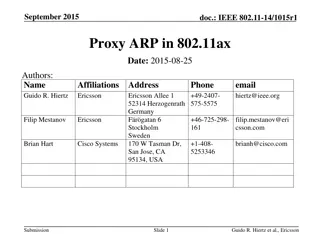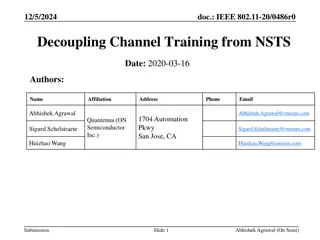Actions Emanating from the Evaluation of the Governance Reform
The evaluation of the governance reform within the WMO aimed to assess its alignment with strategic objectives, effectiveness in responding to societal needs, coordination efficiency, decision-making process, agility, and more. Evaluation criteria included relevance, design validity, effectiveness,
1 views • 13 slides
Comprehensive School Quality Assurance and Evaluation Process
A detailed insight into the Quality Assurance Department's role in school evaluation and improvement processes, including Whole School Evaluation (WSE), Follow-through initiatives, Teaching and Learning assessments, Resumption and Examination Monitoring. The process involves both internal self-evalu
0 views • 20 slides
Methods of Training Evaluation: Overview and Importance
Training and development are fast-growing fields globally, including in India. Evaluation plays a crucial role in understanding the effectiveness and efficiency of training programs for human resource development. This presentation covers the concept of training, evaluation strategies, methods/model
0 views • 61 slides
Universal Evaluation Framework: Simplifying Evaluation Processes
This session introduces the Universal Evaluation Framework (UEF) developed for evaluating QAA Scotland Enhancement Themes. Participants learn key evaluation questions, evidence capture, and the Theory of Change to enhance evaluation confidence. The QAA Scotland Evaluation Odyssey details historical
2 views • 14 slides
Implementing Blind Evaluation Pilot in HORIZON EUROPE: Key Facts and Process
HORIZON EUROPE is conducting a pilot on Blind Evaluation in the 2023-2024 work program to address biases in the research and innovation evaluation process. The pilot aims to assess the feasibility of blind evaluations in ensuring fairness and mitigating potential biases towards well-known organizati
9 views • 9 slides
Strengthening National Evaluation Capacity in the Era of Sustainable Development Goals
The presentation by Vijayalakshmi Vadivelu at the National Evaluation Capacities Conference 2017 in Istanbul focused on the importance of strengthening national evaluation capacity in alignment with the Sustainable Development Goals (SDGs). The content covers the holistic approach to national evalua
3 views • 18 slides
Exploring Developmental Evaluation for Better Decision-Making
Delve into the realm of developmental evaluation, focusing on its purpose, principles, and application in practice. Understand how developmental evaluation emphasizes real-time data collection for informed decision-making in complex systems. Learn about key principles such as developmental purpose,
0 views • 25 slides
Evaluation Practices in Macedonia: What Works, What Doesn't
The comparison between the effectiveness of evaluation practices and the presence of formal institutions in Macedonia raises questions about the impact of institutional design on outcomes. While some countries with robust evaluation institutions fall short in practice, others lacking such structures
1 views • 7 slides
Enhancing Evaluation Capabilities in Mongolia for Agenda 2030
The Mongolian Evaluation Network in collaboration with UNDP is working to integrate the 2030 Agenda into national strategies and plans, establish institutional coordination mechanisms, align budgets, and enhance data monitoring systems. Key stakeholders including government agencies, NGOs, and inter
0 views • 9 slides
Understanding Demi-Regularity in Realist Evaluation
Realist Evaluation is a theory-driven approach focusing on understanding the context and mechanisms of action behind policies and interventions. This webinar explores the concept of demi-regularity in realist evaluation, its origins, and its application in analyzing complex evidence. Key aspects cov
1 views • 16 slides
802.11ax Evaluation for IMT-2020 eMBB in Dense Urban Environments
The document presents a detailed analysis of the 802.11ax technology's performance in meeting IMT-2020 requirements for eMBB in dense urban settings. It includes results from simulations evaluating peak spectral efficiency, data rates, user experience, and mobility metrics. The study confirms 802.11
0 views • 14 slides
Evaluation of IEEE 802.11ax for IMT-2020 eMBB Dense Urban Test Environment
This document discusses the evaluation of IEEE 802.11ax technology in the context of the IMT-2020 Enhanced Mobile Broadband (eMBB) Dense Urban test environment. It analyzes the performance of 802.11ax in meeting the key PHY/MAC metrics required for eMBB Dense Urban scenarios, such as Peak Spectral E
2 views • 13 slides
Understanding Evaluation in Education
Evaluation in education is a comprehensive term that encompasses measurement, testing, and qualitative examination of student behavior. It involves both quantitative and qualitative descriptions, along with value judgments. Differentiating from mere measurement, evaluation provides a deeper analysis
0 views • 28 slides
Revisiting the IEEE 802.11-19/1340r2 Tone Plan Optimization
Revisiting the tone plan optimization for IEEE 802.11-19/1340r2, addressing issues with RUs near band edges, accommodating various STA bandwidth capabilities, and the inefficiencies of non-SST 11ax STAs in different BSS scenarios. Proposals include adapting to unknown future 11ax features, minimizin
5 views • 12 slides
Modulation Schemes for IEEE 802.11bd Range Extension
The document discusses modulation schemes for extending the range in IEEE 802.11bd, aiming for at least 3dB lower sensitivity levels. It highlights the need for an implementation-friendly, proven technology already adopted in IEEE 802.11. The introduction of the MCS0 DCM scheme in 11ax is also cover
0 views • 15 slides
Sustainable Evaluation Systems Workshop Summary
Workshop on Sustainable Evaluation Systems by Stephen Porter at the NEC Conference focused on defining evaluation systems, addressing their failures, and emphasizing the importance of quality, use, and networks in achieving sustainability. Participants engaged in activities such as bingo card introd
0 views • 38 slides
Strategic Management: Strategy Review and Evaluation
This chapter delves into the critical process of strategy review, evaluation, and control in strategic management. It covers the nature of strategy evaluation, effective evaluation systems, contingency planning, auditing, using computers for evaluation, and guidelines for effective strategic managem
1 views • 42 slides
Preliminary Results of IEEE 802.11-19/0728r1 11ax Evaluation on Mobility in Dense Urban eMBB Scenario
Presenting the initial outcomes of simulations on mobility in a Dense Urban enhanced Mobile Broadband (eMBB) scenario using IEEE 802.11-19/0728r1 standard. Results indicate compliance with ITU requirements for IMT-2020 RAT. Simulation parameters, configurations, assumptions, and analysis of mobility
1 views • 14 slides
Understanding Evaluation and Ideology in Translation
Evaluation plays a crucial role in the study of translation, influencing both meaning and value in communication. This evaluation is reflected through language elements like accentuation, deletion, and substitution. Appraisal, stance, and evaluation are key terms in linguistic analysis that focus on
2 views • 22 slides
Impact and Evaluation Toolkit for Churches and Christian Charities
This toolkit aims to equip churches and Christian charities engaged in small-scale social action projects to think about impact, measure impact, choose data tools, reflect on evaluation data, and use it effectively. It covers principles of evaluation, setting objectives, selecting indicators, storyt
0 views • 34 slides
Evaluation Metrics for IEEE 802.11-14/0107 HEW Proposal
Evaluation metrics play a crucial role in assessing WLAN system performance and achieving the objectives of High Efficiency WLAN (HEW). This proposal by Yonggang Fang et al. from ZTE outlines the key evaluation metrics recommended for evaluating HEW performance, including area throughput, average th
0 views • 12 slides
Overview of Monitoring and Evaluation in the GEF
The Evaluation in the GEF and Training Module focuses on promoting accountability and learning within the Global Environment Facility (GEF) through monitoring and evaluation activities. The GEF Independent Evaluation Office plays a crucial role in assessing results, effectiveness, and performance of
0 views • 25 slides
Analytical Evaluation of IMT-2020 mMTC and URLLC Requirements in IEEE 802.11-19/0888r0
This contribution analyzes the IMT-2020 mMTC and URLLC requirements in IEEE 802.11-19/0888r0, evaluating the capabilities of 802.11ax technology in meeting these demands. It discusses key aspects such as connection density, message size, delay per user, evaluation scenarios, system configurations, S
0 views • 9 slides
Benchmarking of 802.11ax for eMBB Indoor Hotspot Using IMT-2020 Simulation Methodology
This presentation continues the benchmarking of 802.11ax capabilities concerning IMT-2020 requirements for eMBB Indoor Hotspot and Dense Urban test environments. The simulations cover UL, mobility aspects, and adherence to ITU-R methodology. Analytical evaluations and simulation results demonstrate
0 views • 16 slides
Enhancing BSS Load Management in 802.11ax Networks
Proposed changes to address load balancing issues in dense 802.11ax scenarios by introducing a new information element for BSS Load. The new element considers OFDMA utilization, UL/DL MU-MIMO, and allows for future extensions to ensure efficient AP selection by unassociated STAs. Enhancements aim to
0 views • 14 slides
Developing an Evaluation Work Plan for Effective Program Assessment
This presentation by Amy D. Andrade from San Jose State University focuses on developing an Evaluation Work Plan to identify responsibilities and timelines. It covers topics such as Evaluation Coaching Support, Webinar Outlines, Logic Model, Inputs-Outputs-Outcomes, Two Approaches to Evaluation, Pro
0 views • 29 slides
Evaluation Synthesis in Changing Contexts: Enhancing Knowledge for Development Effectiveness
Evaluation synthesis is crucial for promoting learning, reflection, and decision-making in development work. This process involves bringing together diverse knowledge sources to generate strategic insights and facilitate wider use of evaluation findings. The Independent Office of Evaluation of IFAD
0 views • 20 slides
IEEE 802.11-19/1099r2 Preamble Structure Overview
The document discusses the specific preamble structures of IEEE standards such as 802.11n, 802.11ac, and the newer 802.11ax (11ax). It explores the functionalities provided by these preambles including synchronization, auto-detection, channel estimation, and more. The focus is on how different stand
0 views • 13 slides
Evaluation of FME Zero Emission Neighbourhoods in Smart Cities
The mid-term evaluation process of FME Zero Emission Neighbourhoods in Smart Cities involves self-evaluation, partner evaluation, and panel evaluation. The procedure includes scientific review, evaluation by scholars, and innovation assessment. Key documents like self-reports, progress reports, and
1 views • 20 slides
Overview of Regular Evaluation 2017 Findings in Estonia
In the Regular Evaluation 2017, efforts were made to maximize the benefits of evaluation outcomes for various stakeholders in Estonia such as the state, society, and institutions. The evaluation focused on a range of actions including preparing legislation, finding experts, creating self-report form
0 views • 6 slides
Power Consumption and Latency in IEEE 802.11ax State Transitions
This document discusses power consumption and latency values in state transitions for IEEE 802.11ax simulation scenarios. It covers power states definition, common power model parameters, and state transitions within the simulation scenarios. The transitions include Transmit to Listen, Receive to Li
0 views • 9 slides
IEEE 802.11ax Sleep States Analysis
This document delves into the analysis of sleep states in IEEE 802.11ax, emphasizing the need for refining current sleep state definitions to adhere to network conditions. It proposes various sleep states modifications to accommodate densification and low power operations, aiming to strike a balance
0 views • 12 slides
Discussion on Power State Definitions in IEEE 802.11ax
This document discusses the power state definitions in IEEE 802.11ax, focusing on Deep Sleep and Shallow Sleep states. It addresses the current consumption values and proposes modifications to enhance the clarity of power state definitions and transitions. The author, Chittabrata Ghosh from Intel, p
0 views • 13 slides
IEEE 802.11-15/0099 Payload Symbol Size for 11ax Study
The document dated January 2015 discusses the payload symbol size for 11ax in IEEE 802.11 standards. It includes contributions from various authors representing companies like Broadcom, Intel, Samsung, Marvell, and NTT. The study addresses technical aspects related to wireless communication technolo
0 views • 33 slides
Comprehensive Guide to Training Evaluation Methods
This detailed guide covers the aim of evaluation, evaluation methods, techniques of evaluation, types of evaluation (formative, process, outcome, impact), and the significance of formative and process evaluation in assessing training effectiveness. Learn about the key principles and practices involv
0 views • 45 slides
Performance Evaluation of Parameterized Spatial Reuse with Coordinated Beamforming for IEEE 802.11be
The study focuses on assessing the performance of parameterized spatial reuse (PSR) with coordinated beamforming/null steering for IEEE 802.11be. The framework allows coordinated sharing of uplink transmission opportunities among APs, demonstrating gains in synchronous coordinated beamforming system
0 views • 19 slides
Performance Evaluation of Coordinated Beamforming with Parameterized Spatial Reuse in IEEE 802.11be
The document discusses the performance evaluation of coordinated beamforming with parameterized spatial reuse (PSR) in IEEE 802.11be. It explores the practical operation of the 802.11ax PSR framework with null steering and the key implementation benefits, emphasizing unsynchronized operation and ada
0 views • 20 slides
Considerations on PHY Padding and Packet Extension in 11ax
The document discusses the proposed PHY padding and packet extension for IEEE 802.11ax, focusing on considerations for processing data within SIFS duration and relaxation of LDPC decoding processing time. It outlines the overview of the proposed padding scheme, considerations for LDPC implementation
0 views • 15 slides
Understanding Proxy ARP Implementation in IEEE 802.11ax
Proposed in September 2015, the document discusses the implementation of Proxy ARP with 802.11ax Access Points. It explains the Address Resolution Protocol (ARP), detailing how devices in a LAN communicate using MAC and IP addresses. The submission aims to provide comprehensive explanations on Proxy
0 views • 18 slides
Decoupling Channel Training Length for EHT Evaluation in IEEE 802.11 - 20/0486r0
Evaluation of decoupling channel training length from the number of streams for EHT in IEEE 802.11. The impact of noise on channel estimation error in data symbol detection is assessed, highlighting techniques for noise improvement. Further insights into 11ax training sequences are provided, along w
0 views • 13 slides










